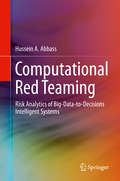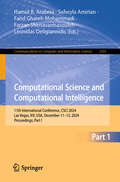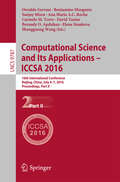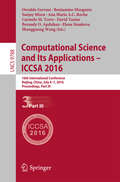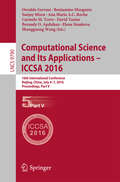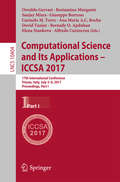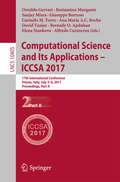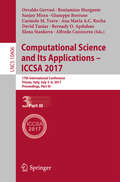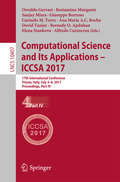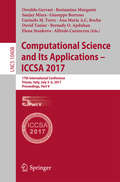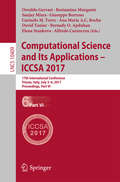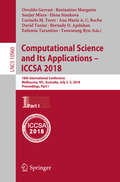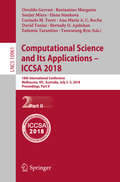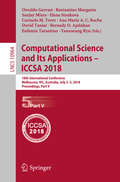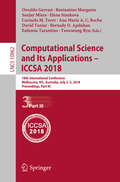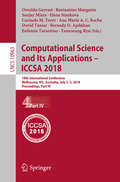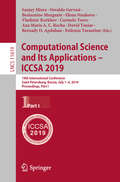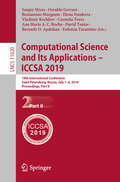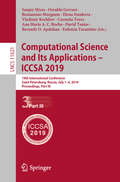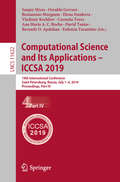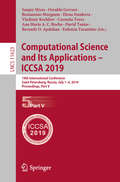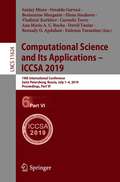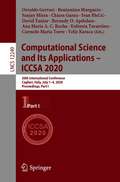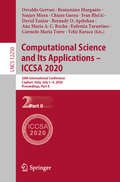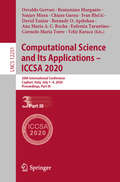- Table View
- List View
Computational Red Teaming: Risk Analytics of Big-Data-to-Decisions Intelligent Systems
by Hussein A. AbbassWritten to bridge the information needs of management and computational scientists, this book presents the first comprehensive treatment of Computational Red Teaming (CRT). The author describes an analytics environment that blends human reasoning and computational modeling to design risk-aware and evidence-based smart decision making systems. He presents the Shadow CRT Machine, which shadows the operations of an actual system to think with decision makers, challenge threats, and design remedies. This is the first book to generalize red teaming (RT) outside the military and security domains and it offers coverage of RT principles, practical and ethical guidelines. The author utilizes Gilbert's principles for introducing a science. Simplicity: where the book follows a special style to make it accessible to a wide range of readers. Coherence: where only necessary elements from experimentation, optimization, simulation, data mining, big data, cognitive information processing, and system thinking are blended together systematically to present CRT as the science of Risk Analytics and Challenge Analytics. Utility: where the author draws on a wide range of examples, ranging from job interviews to Cyber operations, before presenting three case studies from air traffic control technologies, human behavior, and complex socio-technical systems involving real-time mining and integration of human brain data in the decision making environment.
Computational Science and Computational Intelligence: 11th International Conference, CSCI 2024, Las Vegas, NV, USA, December 11–13, 2024, Proceedings, Part I (Communications in Computer and Information Science #2501)
by Hamid R. Arabnia Leonidas Deligiannidis Soheyla Amirian Farzan Shenavarmasouleh Farid Ghareh MohammadiThe CCIS book constitutes selected papers accepted in the Research Track on Artificial Intelligence of the 11th International Conference on Computational Science and Computational Intelligence, CSCI 2024, which took place in Las Vegas, NV, USA, during December 11–13, 2024. The 27 full papers included in this book were carefully reviewed and selected from a total of 383 submissions. They were organized in topical sections on large language models and methodologies; deep learning and applications; artificial intelligence and prediction methods; and artificial intelligence, machine learning, applications and alrogithms.
Computational Science and Its Applications - ICCSA 2016: 16th International Conference, Beijing, China, July 4-7, 2016, Proceedings, Part II (Lecture Notes in Computer Science #9787)
by Shangguang Wang Osvaldo Gervasi Beniamino Murgante Sanjay Misra David Taniar Elena Stankova Ana Maria A.C. Maria A. C. Rocha Carmelo M. M. Torre Bernady O. O. ApduhanThe five-volume set LNCS 9786-9790 constitutes the refereed proceedings of the 16th International Conference on Computational Science and Its Applications, ICCSA 2016, held in Beijing, China, in July 2016. The 239 revised full papers and 14 short papers presented at 33 workshops were carefully reviewed and selected from 849 submissions. They are organized in five thematical tracks: computational methods, algorithms and scientific applications; high performance computing and networks; geometric modeling, graphics and visualization; advanced and emerging applications; and information systems and technologies.
Computational Science and Its Applications - ICCSA 2016: 16th International Conference, Beijing, China, July 4-7, 2016, Proceedings, Part III (Lecture Notes in Computer Science #9788)
by Shangguang Wang Osvaldo Gervasi Beniamino Murgante Sanjay Misra Ana Maria A. C. Rocha Carmelo M. Torre David Taniar Bernady O. Apduhan Elena StankovaThe five-volume set LNCS 9786-9790 constitutes the refereed proceedings of the 16th International Conference on Computational Science and Its Applications, ICCSA 2016, held in Beijing, China, in July 2016. The 239 revised full papers and 14 short papers presented at 33 workshops were carefully reviewed and selected from 849 submissions. They are organized in five thematical tracks: computational methods, algorithms and scientific applications; high performance computing and networks; geometric modeling, graphics and visualization; advanced and emerging applications; and information systems and technologies.
Computational Science and Its Applications – ICCSA 2016: 16th International Conference, Beijing, China, July 4-7, 2016, Proceedings, Part V (Lecture Notes in Computer Science #9790)
by Shangguang Wang Osvaldo Gervasi Beniamino Murgante Sanjay Misra Ana Maria A. C. Rocha Carmelo M. Torre David Taniar Bernady O. Apduhan Elena StankovaThe five-volume set LNCS 9786-9790 constitutes the refereed proceedings of the 16th International Conference on Computational Science and Its Applications, ICCSA 2016, held in Beijing, China, in July 2016. The 239 revised full papers and 14 short papers presented at 33 workshops were carefully reviewed and selected from 849 submissions. They are organized in five thematical tracks: computational methods, algorithms and scientific applications; high performance computing and networks; geometric modeling, graphics and visualization; advanced and emerging applications; and information systems and technologies.
Computational Science and Its Applications – ICCSA 2017: 17th International Conference, Trieste, Italy, July 3-6, 2017, Proceedings, Part I (Lecture Notes in Computer Science #10404)
by Alfredo Cuzzocrea Osvaldo Gervasi Beniamino Murgante Sanjay Misra Carmelo M. Torre David Taniar Bernady O. Apduhan Elena Stankova Giuseppe Borruso Ana Maria A.C. RochaThe six volume set LNCS 10404 until 10409 constitutes the refereed proceedings of the 17th International Conference on Computational Science and Its Applications, ICCSA 2017, held in Trieste, Italy, in July 2017. Apart from the general tracks, ICCSA 2017 also include 43 international workshops, in various areas of computational sciences, ranging from computational science technologies, to specific areas of computational sciences, such as computer graphics and virtual reality. Furthermore, this year ICCSA 2017 hosts the XIV International Workshop On Quantum Reactive Scattering. The program also features 3 keynote speeches and 4 tutorials. The total of 313 full papers and 12 short papers presented in the 6-volume proceedings set were carefully reviewed and selected from 1052 submissions.
Computational Science and Its Applications – ICCSA 2017: 17th International Conference, Trieste, Italy, July 3-6, 2017, Proceedings, Part II (Lecture Notes in Computer Science #10405)
by Osvaldo Gervasi, Beniamino Murgante, Sanjay Misra, Giuseppe Borruso, Carmelo M. Torre, Ana Maria A.C. Rocha, David Taniar, Bernady O. Apduhan, Elena Stankova and Alfredo CuzzocreaThe six-volume set LNCS 10404-10409 constitutes the refereed proceedings of the 17th International Conference on Computational Science and Its Applications, ICCSA 2017, held in Trieste, Italy, in July 2017. The 313 full papers and 12 short papers included in the 6-volume proceedings set were carefully reviewed and selected from 1052 submissions. Apart from the general tracks, ICCSA 2017 included 43 international workshops in various areas of computational sciences, ranging from computational science technologies to specific areas of computational sciences, such as computer graphics and virtual reality. Furthermore, this year ICCSA 2017 hosted the XIV International Workshop On Quantum Reactive Scattering. The program also featured 3 keynote speeches and 4 tutorials.
Computational Science and Its Applications – ICCSA 2017: 17th International Conference, Trieste, Italy, July 3-6, 2017, Proceedings, Part III (Lecture Notes in Computer Science #10406)
by Alfredo Cuzzocrea Osvaldo Gervasi Beniamino Murgante Sanjay Misra Carmelo M. Torre David Taniar Bernady O. Apduhan Elena Stankova Giuseppe Borruso Ana Maria A.C. RochaThe six-volume set LNCS 10404-10409 constitutes the refereed proceedings of the 17th International Conference on Computational Science and Its Applications, ICCSA 2017, held in Trieste, Italy, in July 2017. The 313 full papers and 12 short papers included in the 6-volume proceedings set were carefully reviewed and selected from 1052 submissions. Apart from the general tracks, ICCSA 2017 included 43 international workshops in various areas of computational sciences, ranging from computational science technologies to specific areas of computational sciences, such as computer graphics and virtual reality. Furthermore, this year ICCSA 2017 hosted the XIV International Workshop On Quantum Reactive Scattering. The program also featured 3 keynote speeches and 4 tutorials.
Computational Science and Its Applications – ICCSA 2017: 17th International Conference, Trieste, Italy, July 3-6, 2017, Proceedings, Part IV (Lecture Notes in Computer Science #10407)
by Alfredo Cuzzocrea Osvaldo Gervasi Beniamino Murgante Sanjay Misra Carmelo M. Torre David Taniar Bernady O. Apduhan Elena Stankova Giuseppe Borruso Ana Maria A.C. RochaThe six-volume set LNCS 10404-10409 constitutes the refereed proceedings of the 17th International Conference on Computational Science and Its Applications, ICCSA 2017, held in Trieste, Italy, in July 2017. The 313 full papers and 12 short papers included in the 6-volume proceedings set were carefully reviewed and selected from 1052 submissions. Apart from the general tracks, ICCSA 2017 included 43 international workshops in various areas of computational sciences, ranging from computational science technologies to specific areas of computational sciences, such as computer graphics and virtual reality. Furthermore, this year ICCSA 2017 hosted the XIV International Workshop On Quantum Reactive Scattering. The program also featured 3 keynote speeches and 4 tutorials.
Computational Science and Its Applications – ICCSA 2017: 17th International Conference, Trieste, Italy, July 3-6, 2017, Proceedings, Part V (Lecture Notes in Computer Science #10408)
by Alfredo Cuzzocrea Osvaldo Gervasi Beniamino Murgante Sanjay Misra Carmelo M. Torre David Taniar Bernady O. Apduhan Elena Stankova Giuseppe Borruso Ana Maria A.C. RochaThe six-volume set LNCS 10404-10409 constitutes the refereed proceedings of the 17th International Conference on Computational Science and Its Applications, ICCSA 2017, held in Trieste, Italy, in July 2017. The 313 full papers and 12 short papers included in the 6-volume proceedings set were carefully reviewed and selected from 1052 submissions. Apart from the general tracks, ICCSA 2017 included 43 international workshops in various areas of computational sciences, ranging from computational science technologies to specific areas of computational sciences, such as computer graphics and virtual reality. Furthermore, this year ICCSA 2017 hosted the XIV International Workshop On Quantum Reactive Scattering. The program also featured 3 keynote speeches and 4 tutorials.
Computational Science and Its Applications – ICCSA 2017: 17th International Conference, Trieste, Italy, July 3-6, 2017, Proceedings, Part VI (Lecture Notes in Computer Science #10409)
by Osvaldo Gervasi, Beniamino Murgante, Sanjay Misra, Giuseppe Borruso, Carmelo M. Torre, Ana Maria A.C. Rocha, David Taniar, Bernady O. Apduhan, Elena Stankova and Alfredo CuzzocreaThe six-volume set LNCS 10404-10409 constitutes the refereed proceedings of the 17th International Conference on Computational Science and Its Applications, ICCSA 2017, held in Trieste, Italy, in July 2017. The 313 full papers and 12 short papers included in the 6-volume proceedings set were carefully reviewed and selected from 1052 submissions. Apart from the general tracks, ICCSA 2017 included 43 international workshops in various areas of computational sciences, ranging from computational science technologies to specific areas of computational sciences, such as computer graphics and virtual reality. Furthermore, this year ICCSA 2017 hosted the XIV International Workshop On Quantum Reactive Scattering. The program also featured 3 keynote speeches and 4 tutorials.
Computational Science and Its Applications – ICCSA 2018: 18th International Conference, Melbourne, VIC, Australia, July 2-5, 2018, Proceedings, Part I (Lecture Notes in Computer Science #10960)
by Osvaldo Gervasi Beniamino Murgante Sanjay Misra Carmelo M. Torre David Taniar Bernady O. Apduhan Elena Stankova Ana Maria Rocha Eufemia Tarantino Yeonseung RyuThe five volume set LNCS 10960 until 10964 constitutes the refereed proceedings of the 18th International Conference on Computational Science and Its Applications, ICCSA 2018, held in Melbourne, Australia, in July 2018. Apart from the general tracks, ICCSA 2018 also includes 34 international workshops in various areas of computational sciences, ranging from computational science technologies, to specific areas of computational sciences, such as computer graphics and virtual reality. The total of 265 full papers and 10 short papers presented in the 5-volume proceedings set of ICCSA 2018, were carefully reviewed and selected from 892 submissions.
Computational Science and Its Applications – ICCSA 2018: 18th International Conference, Melbourne, VIC, Australia, July 2-5, 2018, Proceedings, Part II (Lecture Notes in Computer Science #10961)
by Osvaldo Gervasi Beniamino Murgante Sanjay Misra Carmelo M. Torre David Taniar Bernady O. Apduhan Elena Stankova Ana Maria Rocha Eufemia Tarantino Yeonseung RyuThe five volume set LNCS 10960 until 10964 constitutes the refereed proceedings of the 18th International Conference on Computational Science and Its Applications, ICCSA 2018, held in Melbourne, Australia, in July 2018. Apart from the general tracks, ICCSA 2018 also includes 34 international workshops in various areas of computational sciences, ranging from computational science technologies, to specific areas of computational sciences, such as computer graphics and virtual reality. The total of 265 full papers and 10 short papers presented in the 5-volume proceedings set of ICCSA 2018, were carefully reviewed and selected from 892 submissions.
Computational Science and Its Applications – ICCSA 2018: 18th International Conference, Melbourne, VIC, Australia, July 2-5, 2018, Proceedings, Part V (Lecture Notes in Computer Science #10964)
by Osvaldo Gervasi Beniamino Murgante Sanjay Misra Carmelo M. Torre David Taniar Bernady O. Apduhan Elena Stankova Ana Maria Rocha Eufemia Tarantino Yeonseung RyuThe five volume set LNCS 10960 until 10964 constitutes the refereed proceedings of the 18th International Conference on Computational Science and Its Applications, ICCSA 2018, held in Melbourne, Australia, in July 2018. Apart from the general tracks, ICCSA 2018 also includes 34 international workshops in various areas of computational sciences, ranging from computational science technologies, to specific areas of computational sciences, such as computer graphics and virtual reality. The total of 265 full papers and 10 short papers presented in the 5-volume proceedings set of ICCSA 2018, were carefully reviewed and selected from 892 submissions.The paper Nitrogen Gas on Graphene: Pairwise Interaction Potentials is available open access under a Creative Commons Attribution 4.0 International License via link.springer.com.
Computational Science and Its Applications – ICCSA 2018: 18th International Conference, Melbourne, VIC, Australia, July 2–5, 2018, Proceedings, Part III (Lecture Notes in Computer Science #10962)
by Osvaldo Gervasi Beniamino Murgante Sanjay Misra Carmelo M. Torre David Taniar Bernady O. Apduhan Elena Stankova Ana Maria Rocha Eufemia Tarantino Yeonseung RyuThe five volume set LNCS 10960 until 10964 constitutes the refereed proceedings of the 18th International Conference on Computational Science and Its Applications, ICCSA 2018, held in Melbourne, Australia, in July 2018.Apart from the general tracks, ICCSA 2018 also includes 34 international workshops in various areas of computational sciences, ranging from computational science technologies, to specific areas of computational sciences, such as computer graphics and virtual reality.The total of 265 full papers and 10 short papers presented in the 5-volume proceedings set of ICCSA 2018, were carefully reviewed and selected from 892 submissions.
Computational Science and Its Applications – ICCSA 2018: 18th International Conference, Melbourne, VIC, Australia, July 2–5, 2018, Proceedings, Part IV (Lecture Notes in Computer Science #10963)
by Osvaldo Gervasi Beniamino Murgante Sanjay Misra Carmelo M. Torre David Taniar Bernady O. Apduhan Elena Stankova Ana Maria Rocha Eufemia Tarantino Yeonseung RyuThe five volume set LNCS 10960 until 10964 constitutes the refereed proceedings of the 18th International Conference on Computational Science and Its Applications, ICCSA 2018, held in Melbourne, Australia, in July 2018. Apart from the general tracks, ICCSA 2018 also includes 34 international workshops in various areas of computational sciences, ranging from computational science technologies, to specific areas of computational sciences, such as computer graphics and virtual reality.
Computational Science and Its Applications – ICCSA 2019: 19th International Conference, Saint Petersburg, Russia, July 1–4, 2019, Proceedings, Part I (Lecture Notes in Computer Science #11619)
by Osvaldo Gervasi Beniamino Murgante Sanjay Misra Ana Maria A. C. Rocha David Taniar Bernady O. Apduhan Elena Stankova Eufemia Tarantino Vladimir Korkhov Carmelo TorreThe six volumes LNCS 11619-11624 constitute the refereed proceedings of the 19th International Conference on Computational Science and Its Applications, ICCSA 2019, held in Saint Petersburg, Russia, in July 2019.The 64 full papers, 10 short papers and 259 workshop papers presented were carefully reviewed and selected form numerous submissions. The 64 full papers are organized in the following five general tracks: computational methods, algorithms and scientific applications; high performance computing and networks; geometric modeling, graphics and visualization; advanced and emerging applications; and information systems and technologies. The 259 workshop papers were presented at 33 workshops in various areas of computational sciences, ranging from computational science technologies to specific areas of computational sciences, such as software engineering, security, artificial intelligence and blockchain technologies.
Computational Science and Its Applications – ICCSA 2019: 19th International Conference, Saint Petersburg, Russia, July 1–4, 2019, Proceedings, Part II (Lecture Notes in Computer Science #11620)
by Osvaldo Gervasi Beniamino Murgante Sanjay Misra Ana Maria A. C. Rocha David Taniar Bernady O. Apduhan Elena Stankova Eufemia Tarantino Vladimir Korkhov Carmelo TorreThe six volumes LNCS 11619-11624 constitute the refereed proceedings of the 19th International Conference on Computational Science and Its Applications, ICCSA 2019, held in Saint Petersburg, Russia, in July 2019.The 64 full papers, 10 short papers and 259 workshop papers presented were carefully reviewed and selected form numerous submissions. The 64 full papers are organized in the following five general tracks: computational methods, algorithms and scientific applications; high performance computing and networks; geometric modeling, graphics and visualization; advanced and emerging applications; and information systems and technologies. The 259 workshop papers were presented at 33 workshops in various areas of computational sciences, ranging from computational science technologies to specific areas of computational sciences, such as software engineering, security, artificial intelligence and blockchain technologies.
Computational Science and Its Applications – ICCSA 2019: 19th International Conference, Saint Petersburg, Russia, July 1–4, 2019, Proceedings, Part III (Lecture Notes in Computer Science #11621)
by Osvaldo Gervasi Beniamino Murgante Sanjay Misra Ana Maria A. C. Rocha David Taniar Bernady O. Apduhan Elena Stankova Eufemia Tarantino Vladimir Korkhov Carmelo TorreThe six volumes LNCS 11619-11624 constitute the refereed proceedings of the 19th International Conference on Computational Science and Its Applications, ICCSA 2019, held in Saint Petersburg, Russia, in July 2019.The 64 full papers, 10 short papers and 259 workshop papers presented were carefully reviewed and selected form numerous submissions. The 64 full papers are organized in the following five general tracks: computational methods, algorithms and scientific applications; high performance computing and networks; geometric modeling, graphics and visualization; advanced and emerging applications; and information systems and technologies. The 259 workshop papers were presented at 33 workshops in various areas of computational sciences, ranging from computational science technologies to specific areas of computational sciences, such as software engineering, security, artificial intelligence and blockchain technologies.
Computational Science and Its Applications – ICCSA 2019: 19th International Conference, Saint Petersburg, Russia, July 1–4, 2019, Proceedings, Part IV (Lecture Notes in Computer Science #11622)
by Osvaldo Gervasi Beniamino Murgante Sanjay Misra Ana Maria A. C. Rocha David Taniar Bernady O. Apduhan Elena Stankova Eufemia Tarantino Vladimir Korkhov Carmelo TorreThe six volumes LNCS 11619-11624 constitute the refereed proceedings of the 19th International Conference on Computational Science and Its Applications, ICCSA 2019, held in Saint Petersburg, Russia, in July 2019.The 64 full papers, 10 short papers and 259 workshop papers presented were carefully reviewed and selected form numerous submissions. The 64 full papers are organized in the following five general tracks: computational methods, algorithms and scientific applications; high performance computing and networks; geometric modeling, graphics and visualization; advanced and emerging applications; and information systems and technologies. The 259 workshop papers were presented at 33 workshops in various areas of computational sciences, ranging from computational science technologies to specific areas of computational sciences, such as software engineering, security, artificial intelligence and blockchain technologies.
Computational Science and Its Applications – ICCSA 2019: 19th International Conference, Saint Petersburg, Russia, July 1–4, 2019, Proceedings, Part V (Lecture Notes in Computer Science #11623)
by Osvaldo Gervasi Beniamino Murgante Sanjay Misra Ana Maria A. C. Rocha David Taniar Bernady O. Apduhan Elena Stankova Eufemia Tarantino Vladimir Korkhov Carmelo TorreThe six volumes LNCS 11619-11624 constitute the refereed proceedings of the 19th International Conference on Computational Science and Its Applications, ICCSA 2019, held in Saint Petersburg, Russia, in July 2019.The 64 full papers, 10 short papers and 259 workshop papers presented were carefully reviewed and selected form numerous submissions. The 64 full papers are organized in the following five general tracks: computational methods, algorithms and scientific applications; high performance computing and networks; geometric modeling, graphics and visualization; advanced and emerging applications; and information systems and technologies. The 259 workshop papers were presented at 33 workshops in various areas of computational sciences, ranging from computational science technologies to specific areas of computational sciences, such as software engineering, security, artificial intelligence and blockchain technologies.
Computational Science and Its Applications – ICCSA 2019: 19th International Conference, Saint Petersburg, Russia, July 1–4, 2019, Proceedings, Part VI (Lecture Notes in Computer Science #11624)
by Osvaldo Gervasi Beniamino Murgante Sanjay Misra Ana Maria A. C. Rocha David Taniar Bernady O. Apduhan Elena Stankova Eufemia Tarantino Vladimir Korkhov Carmelo TorreThe six volumes LNCS 11619-11624 constitute the refereed proceedings of the 19th International Conference on Computational Science and Its Applications, ICCSA 2019, held in Saint Petersburg, Russia, in July 2019.The 64 full papers, 10 short papers and 259 workshop papers presented were carefully reviewed and selected form numerous submissions. The 64 full papers are organized in the following five general tracks: computational methods, algorithms and scientific applications; high performance computing and networks; geometric modeling, graphics and visualization; advanced and emerging applications; and information systems and technologies. The 259 workshop papers were presented at 33 workshops in various areas of computational sciences, ranging from computational science technologies to specific areas of computational sciences, such as software engineering, security, artificial intelligence and blockchain technologies.
Computational Science and Its Applications – ICCSA 2020: 20th International Conference, Cagliari, Italy, July 1–4, 2020, Proceedings, Part I (Lecture Notes in Computer Science #12249)
by Osvaldo Gervasi Beniamino Murgante Sanjay Misra Ana Maria A. C. Rocha David Taniar Bernady O. Apduhan Eufemia Tarantino Chiara Garau Ivan Blečić Carmelo Maria Torre Yeliz KaracaThe seven volumes LNCS 12249-12255 constitute the refereed proceedings of the 20th International Conference on Computational Science and Its Applications, ICCSA 2020, held in Cagliari, Italy, in July 2020. Due to COVID-19 pandemic the conference was organized in an online event.Computational Science is the main pillar of most of the present research, industrial and commercial applications, and plays a unique role in exploiting ICT innovative technologies.The 466 full papers and 32 short papers presented were carefully reviewed and selected from 1450 submissions. Apart from the general track, ICCSA 2020 also include 52 workshops, in various areas of computational sciences, ranging from computational science technologies, to specific areas of computational sciences, such as software engineering, security, machine learning and artificial intelligence, blockchain technologies, and of applications in many fields.
Computational Science and Its Applications – ICCSA 2020: 20th International Conference, Cagliari, Italy, July 1–4, 2020, Proceedings, Part II (Lecture Notes in Computer Science #12250)
by Osvaldo Gervasi Beniamino Murgante Sanjay Misra Ana Maria A. C. Rocha David Taniar Bernady O. Apduhan Eufemia Tarantino Chiara Garau Ivan Blečić Carmelo Maria Torre Yeliz KaracaThe seven volumes LNCS 12249-12255 constitute the refereed proceedings of the 20th International Conference on Computational Science and Its Applications, ICCSA 2020, held in Cagliari, Italy, in July 2020. Due to COVID-19 pandemic the conference was organized in an online event.Computational Science is the main pillar of most of the present research, industrial and commercial applications, and plays a unique role in exploiting ICT innovative technologies.The 466 full papers and 32 short papers presented were carefully reviewed and selected from 1450 submissions. Apart from the general track, ICCSA 2020 also include 52 workshops, in various areas of computational sciences, ranging from computational science technologies, to specific areas of computational sciences, such as software engineering, security, machine learning and artificial intelligence, blockchain technologies, and of applications in many fields.
Computational Science and Its Applications – ICCSA 2020: 20th International Conference, Cagliari, Italy, July 1–4, 2020, Proceedings, Part III (Lecture Notes in Computer Science #12251)
by Osvaldo Gervasi Beniamino Murgante Sanjay Misra Ana Maria A. C. Rocha David Taniar Bernady O. Apduhan Eufemia Tarantino Chiara Garau Ivan Blečić Carmelo Maria Torre Yeliz KaracaThe seven volumes LNCS 12249-12255 constitute the refereed proceedings of the 20th International Conference on Computational Science and Its Applications, ICCSA 2020, held in Cagliari, Italy, in July 2020. Due to COVID-19 pandemic the conference was organized in an online event.Computational Science is the main pillar of most of the present research, industrial and commercial applications, and plays a unique role in exploiting ICT innovative technologies.The 466 full papers and 32 short papers presented were carefully reviewed and selected from 1450 submissions. Apart from the general track, ICCSA 2020 also include 52 workshops, in various areas of computational sciences, ranging from computational science technologies, to specific areas of computational sciences, such as software engineering, security, machine learning and artificial intelligence, blockchain technologies, and of applications in many fields.
